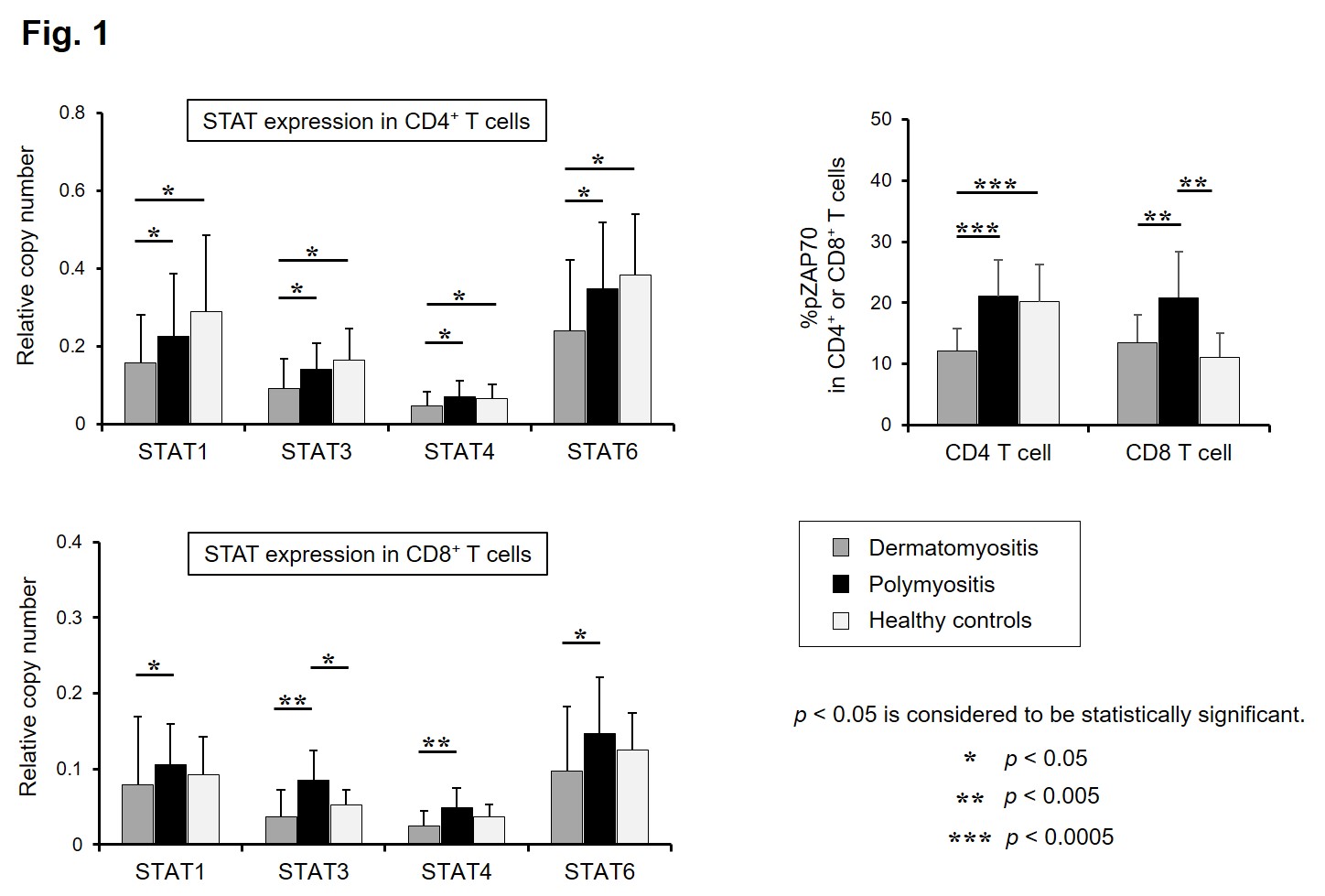Session Information
Session Type: ACR Poster Session B
Session Time: 9:00AM-11:00AM
Background/Purpose: In dermatomyositis (DM) and polymyositis (PM), the characteristics of T cell expression in peripheral blood have been previously described; especially, decreased expression of interferon-γ (IFN-γ) and interleukin-17 (IL-17) producing CD4+ T cells was significantly demonstrated in the acute phase of DM. However, the mechanism underlying the decrease in circulating IFN-γ and IL-17 producing CD4+ T cell expression is still unknown. The purpose of this study was to investigate the T-cell receptor (TCR)-mediated intracellular signaling in peripheral blood T cells in DM and PM.
Methods: Peripheral blood T cells from 86 patients with DM (n = 57) and PM (n = 29), as well as from 28 healthy controls, were used for experimental investigations. T-cell subtypes and TCR-induced phosphorylated zeta-chain-associated protein kinase 70 (pZAP70) were analyzed by flow cytometry. Signal transducer and activator of transcription (STAT) and some inhibitory factors in T cells stimulated with anti-CD3/CD28 beads were also investigated by quantitative real-time polymerase chain reaction.
Results: Counts of CD3+, CD4+, and CD8+ T cell were significantly lower in DM than in PM (p < 0.0005). Moreover, STAT and pZAP70 expression in CD4+ T cells significantly decreased in DM (p < 0.05), whereas that in CD8+ T cells significantly increased in PM (p < 0.05) (Fig.1). Lower expression of forkhead box transcription factor (FoxP3) was also demonstrated in DM than in both PM and HC (p < 0.005). Especially in DM, a positive correlation between CD4+ T cell counts and STAT expression was detected (p < 0.05). In addition, low CD4+ T cell counts as well as reduced STAT expression were prominent in patients with interstitial lung disease (p < 0.05). STAT and pZAP70 expression significantly improved after clinical remission in both DM and PM (p < 0.05), although expression of FoxP3 remained suppressed. Besides, upregulation of suppressor of cytokine signaling-3 (SOCS3) and downregulation of interleukin 6 signal transducer (IL6ST) in CD4+ T cells were observed in both DM and PM (p < 0.05); however, no significant improvements were detected after clinical remission.
Conclusion: STAT expression and TCR-proximal signaling in CD4+ T cells were suppressed in DM, whereas those in CD8+ T cells were induced in PM, suggesting that TCR-mediated signaling may be a key pathway to determine the characteristics of peripheral blood T cells in DM and PM. Furthermore, upregulation of SOCS3 and downregulation of IL6ST and FoxP3 in CD4+ T cells cause an imbalance in intracellular signaling which may be associated with the development of DM.
To cite this abstract in AMA style:
Shimojima Y, Kishida D, Sekijima Y. The Characteristic T-Cell Receptor-Mediated Signaling of Peripheral Blood T Cells in Dermatomyositis and Polymyositis [abstract]. Arthritis Rheumatol. 2017; 69 (suppl 10). https://acrabstracts.org/abstract/the-characteristic-t-cell-receptor-mediated-signaling-of-peripheral-blood-t-cells-in-dermatomyositis-and-polymyositis/. Accessed .« Back to 2017 ACR/ARHP Annual Meeting
ACR Meeting Abstracts - https://acrabstracts.org/abstract/the-characteristic-t-cell-receptor-mediated-signaling-of-peripheral-blood-t-cells-in-dermatomyositis-and-polymyositis/
